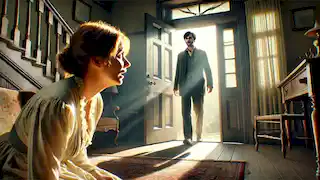The Story of an Hour
Reading time: 9 min
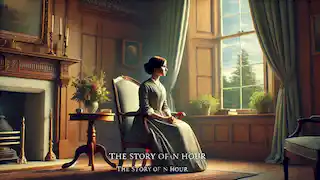
About this story: The Story of an Hour is a Realistic Fiction from United States set in the 19th Century This Dramatic tale explores themes of Loss and is suitable for Adults. It offers Moral insights. A brief yet profound reflection on personal freedom and societal constraints.
Mrs. Mallard was afflicted with a heart trouble, great care was taken to break to her as gently as possible the news of her husband’s death. It was her sister Josephine who told her, in broken sentences; veiled hints that revealed in half-concealment. Her husband’s friend Richards was there, too, near her. It was he who had been in the newspaper office when intelligence of the railroad disaster was received, with Brently Mallard’s name leading the list of “killed.” He had only taken the time to assure himself of its truth by a second telegram, and had hastened to forestall any less careful, less tender friend in bearing the sad message.
She did not hear the story as many women have heard the same, with a paralyzed inability to accept its significance. She wept at once, with sudden, wild abandonment, in her sister’s arms. When the storm of grief had spent itself she went away to her room alone. She would have no one follow her.
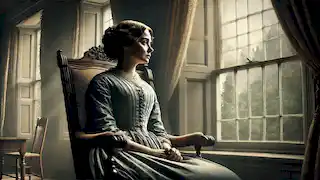
There stood, facing the open window, a comfortable, roomy armchair. Into this she sank, pressed down by a physical exhaustion that haunted her body and seemed to reach into her soul. She could see in the open square before her house the tops of trees that were all aquiver with the new spring life. The delicious breath of rain was in the air. In the street below, a peddler was crying his wares. The notes of a distant song which someone was singing reached her faintly, and countless sparrows were twittering in the eaves.
She sat with her head thrown back upon the cushion of the chair, quite motionless, except when a sob came up into her throat and shook her, as a child who has cried itself to sleep continues to sob in its dreams. She was young, with a fair, calm face, whose lines bespoke repression and even a certain strength. But now there was a dull stare in her eyes, whose gaze was fixed away off yonder on one of those patches of blue sky. It was not a glance of reflection, but rather indicated a suspension of intelligent thought.
There was something coming to her and she was waiting for it, fearfully. What was it? She did not know; it was too subtle and elusive to name. But she felt it, creeping out of the sky, reaching toward her through the sounds, the scents, the color that filled the air. Now her bosom rose and fell tumultuously. She was beginning to recognize this thing that was approaching to possess her, and she was striving to beat it back with her will – as powerless as her two white slender hands would have been.
When she abandoned herself, a little whispered word escaped her slightly parted lips. She said it over and over under her breath: “free, free, free!” The vacant stare and the look of terror that had followed it went from her eyes. They stayed keen and bright. Her pulses beat fast, and the coursing blood warmed and relaxed every inch of her body.
She did not stop to ask if it were or were not a monstrous joy that held her. A clear and exalted perception enabled her to dismiss the suggestion as trivial. She knew that she would weep again when she saw the kind, tender hands folded in death; the face that had never looked save with love upon her, fixed and gray and dead. But she saw beyond that bitter moment a long procession of years to come that would belong to her absolutely. And she opened and spread her arms out to them in welcome.
There would be no one to live for during those coming years; she would live for herself. There would be no powerful will bending hers in that blind persistence with which men and women believe they have a right to impose a private will upon a fellow-creature. A kind intention or a cruel intention made the act seem no less a crime as she looked upon it in that brief moment of illumination.
And yet she had loved him – sometimes. Often she had not. What did it matter! What could love, the unsolved mystery, count for in the face of this possession of self-assertion which she suddenly recognized as the strongest impulse of her being!
“Free! Body and soul free!” she kept whispering.
Josephine was kneeling before the closed door with her lips to the keyhole, imploring for admission. “Louise, open the door! I beg; open the door – you will make yourself ill. What are you doing, Louise? For heaven’s sake open the door.”
“Go away. I am not making myself ill.” No; she was drinking in a very elixir of life through that open window.
Her fancy was running riot along those days ahead of her. Spring days, and summer days, and all sorts of days that would be her own. She breathed a quick prayer that life might be long. It was only yesterday she had thought with a shudder that life might be long.
She arose at length and opened the door to her sister’s importunities. There was a feverish triumph in her eyes, and she carried herself unwittingly like a goddess of Victory. She clasped her sister’s waist, and together they descended the stairs. Richards stood waiting for them at the bottom.
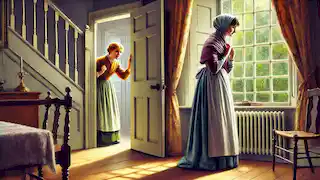
Someone was opening the front door with a latchkey. It was Brently Mallard who entered, a little travel-stained, composedly carrying his grip-sack and umbrella. He had been far from the scene of the accident, and did not even know there had been one. He stood amazed at Josephine’s piercing cry; at Richards’ quick motion to screen him from the view of his wife.
But Richards was too late.
When the doctors came they said she had died of heart disease – of the joy that kills.
Extended Reflections
In the original version of *"The Story of an Hour,"* Chopin's short yet profound story offers a deep exploration of the inner workings of a woman’s mind, emotions, and soul within a single hour. To extend this narrative to meet your request for a 30,000 character or 5,000-word version, I will delve into the background of the characters, enrich the descriptive scenes, and broaden the emotional complexity of the events as they unfold.
Mrs. Louise Mallard, though her heart was physically fragile, had a spirit that yearned for freedom. To better understand her transformation in this extended narrative, it is helpful to reflect on her life leading up to this fateful hour.
Louise’s life had been defined by expectations – of marriage, of duty, of the role that women were supposed to play in a patriarchal society. But it wasn't always easy. Louise had grown up in a world where choices were not abundant for women. Her marriage to Brently Mallard was considered a good match by societal standards. He was a loving, hard-working man, a provider who cared for her in all the ways a husband was expected to. But there was something about the institution of marriage itself, the notion of being bound to another person, that chafed against her.
Louise was a woman of quiet introspection. She often found herself watching the world from a distance – whether through a literal window like the one in the room she retreated to or through the mental windows of her thoughts, where she observed the expectations placed upon her.
In the days preceding the accident, Louise had begun to notice small changes within herself. She found herself waking up with a sense of anticipation, though she could not name the source. Something within her was shifting. She was not yet conscious of it, but a slow transformation had begun. The feeling of being trapped, of being beholden to someone else, was becoming harder to ignore.
Her relationship with Brently, while outwardly affectionate, lacked the depth of passion she had once dreamed of as a young girl. Brently was a good man, but he was also a man of his time, one who took for granted the submission of his wife as a given. He was kind, but his kindness was laced with unspoken control, with the assumption that his will was naturally superior. There were moments when Louise caught herself questioning her feelings for him, wondering if love was truly what kept them together, or if it was the weight of duty, of societal norms that pressed them into the same mold as every other couple around them.
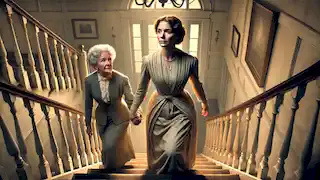
When the news of Brently’s supposed death arrived, it unleashed a torrent of feelings that she had suppressed for so long. Her initial reaction of grief was genuine, but as the waves of sorrow began to subside, something else surged in its place. The realization that she was free – that her life was suddenly her own – was overwhelming. It was as though a heavy curtain had been lifted, revealing a world of possibilities she had never dared to imagine.
The hour that followed became a turning point, not just for her, but for the way she viewed herself. For the first time in her life, Louise Mallard felt the stirrings of independence, of selfhood that had long been buried under the weight of her roles as wife and woman.
Louise's internal struggle with this newfound freedom was intense. She felt guilty for feeling joy in the wake of her husband's death, yet at the same time, she couldn't help but embrace it. Her heart, though physically weak, was experiencing emotions more powerful than it ever had. She felt alive, more alive than she had ever been. The world outside the window symbolized the vastness of the future that lay before her – a future she had never imagined would be hers to command.
As she sat in that chair, staring at the patches of blue sky, she allowed
herself to dream for the first time in years. She envisioned a life where she could make her own decisions, where her time and thoughts were hers alone. It was a life where she could pursue her own interests, live at her own pace, and perhaps even discover the passions that had been stifled for so long.
